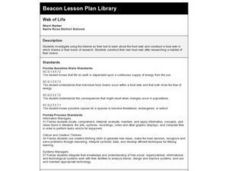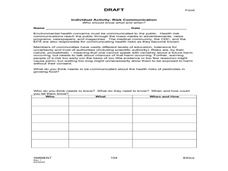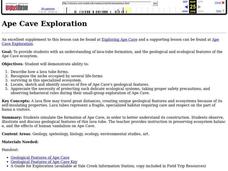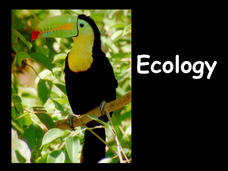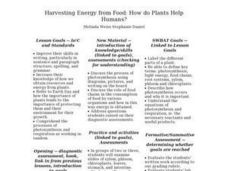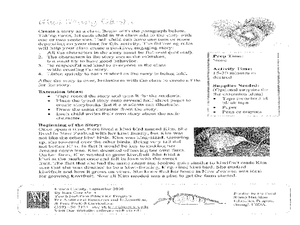Curated OER
Forest Food Webs
Students consider the interdependency of life in a temperate forest by studying selected organisms from an Asian temperate forest and creating a food web.
Curated OER
Web of Life - Alaska
Seventh graders research Alaska, then construct their own food web after researching a habitat of their choice.
Curated OER
Ecosystems
Young scholars work in small groups to create a poster illustrating the flow of energy through a typical ecosystem, then present their posters to the class.
Curated OER
Chemistry of Food
In this chemistry of food worksheet, students complete 20 various types of questions related to food and nutrition. First, they complete a crossword puzzle with vocabulary terms. Then, students use the figure shown to write the...
Curated OER
How is Your Food Grown
Students consider how their food is grown due to pesticide use. They reflect on the harm done to the various groups, then discuss the ethical questions from the perspectives of different stakeholders. IN addition, they compile relevant...
Curated OER
Explore the Food Web
Students identify plants and animals in the journals of Lewis and Clark's expedition. They describe the various animal habits. Students interpret the behaviors of the animals discovered on the expedition. They design a food web using...
Curated OER
Dollar Value and Fast-Food Nutrition
Students examine how they can make changes to form healthy eating habits. In this investigative lesson students examine food guidelines and the food pyramid.
Curated OER
The Biosphere
In this biosphere worksheet, students identify the different levels of organization that ecologists study. Students complete charts, sentences, and answer short answer questions.
Curated OER
Ape Cave Exploration
Pupils simulate online the formation of Ape Cave, in order to better explain its construction. They observe, illustrate and discuss geological features of this lava tube.
Curated OER
Amazing Animals
Students, in beginning and advanced beginning ESL levels, use English in an animal lesson.
Curated OER
Don't Worm Your Way Out of This One!
Students study different aspects of worms along with the process of vermicomposting by participating in a class experiment to study the time it takes for breakfast cereal to be eaten by worms.
Curated OER
Book Making
Students make connections with real life experiences and the two languages, including Spanish and English. They create their own books in this project lesson plan to take home and read with their families. Students also use a digital...
Curated OER
How Does Energy Cycle in Ecosystems?
In this energy cycle worksheet, students will write in examples for each trophic level in an energy cycle: top, middle, and lowest levels.
Curated OER
Critters in the Classroom
Students investigate with sea urchins. In this ocean habitat lesson, students observe sea urchins and other ocean grazers. Students work with lab equipment to examine the anatomy of these creatures.
Curated OER
Kansas Crops: From Seeds to Food
First graders explore U.S. geography by researching food production. In this agriculture lesson, 1st graders identify the process of crops from a seed to a plate and discuss the importance of farmers in the production of such crops....
Science Matters
Matter Cycles — Sum It Up
Scholars become part of the cycle of matter with a reader's theater that showcases producers, consumers, decomposers, and the sun. A diagram and discussion concludes the learning experience and enhances comprehension.
Biology Junction
Ecology
Psychologists study human relationships while ecologist study relationships between organisms in the environment. An introduction to ecology and the related vocabulary benefits scholars as they progress through the presentation and...
Curated OER
Harvesting Energy from Food: How do Plants Help Humans?
Beginning botanists view slides of plant vascular tissue. They watch Magic School Bus Gets Planted, which you can find online, and then write a summary of what they have learned about plants. This lesson could be used with upper...
Science Matters
Ecosystem Pre-Assessment
Test scholars' knowledge of ecosystems with a 20-question pre-assessment. Assessment challenges learners to answer multiple choice questions, read diagrams, and complete charts.
Curated OER
Cellular Respiration
Students are often confused by the huge amount of information and detail that can be learned about respiration. This is a great presentation summarizing the main 4 stages of cellular respiration. It is clear and uses diagrams and labels...
Scholastic
Minibeasts
Lead young scientists to discover insects outdoors. After investigating, students will record observations, learn about these fascinating creatures, craft, and role play.
Channel Islands Film
Natural Resources, and Human Uses of Plants and Animals
As part of their study of the restoration projects on Santa Cruz Island, class members demonstrate their understanding of the connections among plant life, animals, and the actions of humans by crafting a model that reveals these...
Curated OER
Layers of the Rainforest
What a great way to discuss the rainforest! Learners discuss the importance of adaptation in the environment and how it is linked to survival. They use critical thinking and inference skills to place animals and insects in the different...
Curated OER
Kiwi Story Chain
Write a story as a class. For this writing lesson, each person takes turns writing one to two sentences onto the paragraph given about Kim the Kiwi bird, including characters and events. Altogether, brainstorm a title for the story....
Other popular searches
- Deciduous Forest Food Chains
- Food Chains in Biomes
- Food Chains Food Webs
- Food Chains and Webs
- Food Chains Decomposers
- Food Chains and Food Webs
- Animal Food Chains
- Ocean Food Chains
- Meadow Food Chains
- Food Chains, Food Webs
- Guided Discovery Food Chains
- Food Chains Webs



